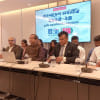FDI needed for RMG's sustainability

Foreign direct investment (FDI) is needed in the garment sector, especially for non-cotton and high value added items, Khondaker Golam Moazzem, research director of Centre for Policy Dialogue (CPD), said yesterday.
"FDI is required for the sustainability of the readymade garment industry," he said while presenting a paper titled "Bangladesh's RMG industry in global apparel value chain: Competitiveness, profit margin, labour productivity and minimum wages" at The Daily Star Centre.
The Daily Star organised the session.
Moazzem said Bangladesh is very good at making cotton clothes but lacks strength in non-cotton products, adding that it could be bolstered by foreign investment.
Foreign investment is also necessary for the sustainability of the RMG sector, he said, adding that injection of foreign capital in the sector is mandatory in order to take the sector forward.
Moazzem said corporatisation is also necessary in the sector as many second-generation owners are not willing to manage workers' issues.
"The first generation established the factories and managed the workers, but the second generation is not interested in managing the workers' issues because of the complexities," he said.
The second generation, most of whom have come back after studying at western universities, are more interested in other management rather than the worker management. At the same time, innovation is not being observed in the sector, he said.
"The only way is the corporatisation," Moazzem said.
He added that productivity in the garment sector had increased over the years because of automation in different segments of the production system. However, due to weakness in negotiations with international clothing retailers and brands, they are not getting proper prices.
Moazzem also said local garment factories were getting a lot of work orders as Chinese manufacturers are discontinuing low-cost basic garment items and, in many cases, the Chinese government imposes duty on export of garment items mainly to discourage the production of basic garment items.
He also said that when the workers' wages were fixed, factors other than inflation were not widely considered.
Around 10 other factors needed to be considered such as workers' living cost, standard of living, productivity, price of products, cost of production and business capability. Other factors such as socio-economic conditions, risk involved with work, locality concerned and other relevant factors were also not properly considered in the wage-fixing process, he said.

 For all latest news, follow The Daily Star's Google News channel.
For all latest news, follow The Daily Star's Google News channel. 








Comments